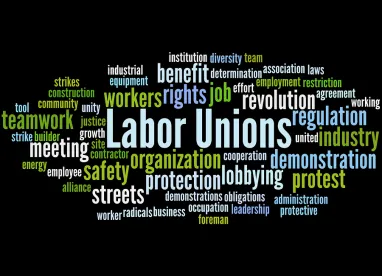On Thursday, February 6, 2020 the U.S. House of Representatives passed the Protecting the Right to Organize Act, also known as the “PRO Act”. The legislation (which can be viewed here), passed mostly along party lines, would provide sweeping changes to the NLRA that would enhance greatly the ability of unions to organize employees and permit the NLRB to impose penalties on employers who retaliate against those seeking to unionize. The PRO Act, if enacted, would be the most significant series of amendments to the 85 year-old National Labor Relations Act and is essentially a pro-labor “wish list” that unions have long-sought since the Taft-Hartley amendments passed in 1947.
However, the PRO Act is likely “dead on arrival” in the Republican-majority U.S. Senate. Indeed, the chairman of the Committee on Health, Education, Labor and Pensions already has stated that the Committee will not take up the bill this session. This said, the PRO Act clearly outlines the Democratic Party’s legislative goals in the area of labor relations, and many of the Democratic presidential candidates have endorsed the bill. Should the balance of power in Washington change after the 2020 election, the PRO Act (or some form of it) would be more likely to pass.
Summary of the PRO Act
The PRO Act touches upon nearly every aspect of labor-management relations governed by the NLRA and reverses several recent employer-friendly rulings by the NLRB and the Supreme Court, and NLRB rulemakings.
Specifically, the PRO Act would:
-
Expand the protections of the NLRA to more workers by adopting a narrow criteria to classify a worker as an independent contractor. Under the PRO Act, more workers in the “gig economy” could potentially be classified as employees entitled to NLRA protection.
-
Require an employer to recognize a union based on a “card-check” authorization, in the event the union loses an election and the NLRB determines that an employer improperly interfered with the election. Currently, no such requirement exists.
-
Enable the NLRB to levy civil penalties against employers who commit unfair labor practices under NLRA Section 8(a) of up to $50,000 for each violation, and in certain cases, up to $100,000. Currently, no monetary penalties exist.
-
In first-contract negotiations, compel the employer and the union to mediation by the Federal Mediation and Conciliation Service in the event the parties fail to reach an agreement within 90-days of commencing collective bargaining negotiations. If mediation fails, the FMCS must refer any disputes to a three-person arbitration panel for interest arbitration. The panel would then by majority vote be able to set the terms of the agreement and would be binding on the parties for a period of two years, unless amended by the parties. Interest arbitration for contract disputes is common in the public sector, but not the private sector.
-
Supersede “right-to-work” laws by permitting employers and unions in all 50 states to agree upon a “fair share” clause, which would require all workers who are covered by a collective bargaining agreement to contribute union dues for the “cost of representation, collective bargaining, contract enforcement, and related expenditures.”
-
Permit workers to engage in secondary boycotts and prevent employers from permanently replacing strikers.
-
Grant workers the right to bring civil actions in federal district court against employers under Section 8(a)(1) or (3), after the expiration of a 60-day period following the filing of a charge with the NLRB, or if the NLRB determines not to issue a complaint. Further, employers would not be able to enter into agreements preventing employees from joining class or collective actions arising out of their employment relationship. Under the PRO Act, class and collective actions would be “protected activity” under Section 7.
-
Authorize employees to use an employer’s electronic communication devices and systems, including company computers, internet access, email, cell phones or “other company equipment” to engage in activities protected by Section 7.
-
Make required attendance at an employer’s organizing campaign meetings an unfair labor practice.
Stay tuned for all developments regarding the PRO Act.





 />i
/>i

